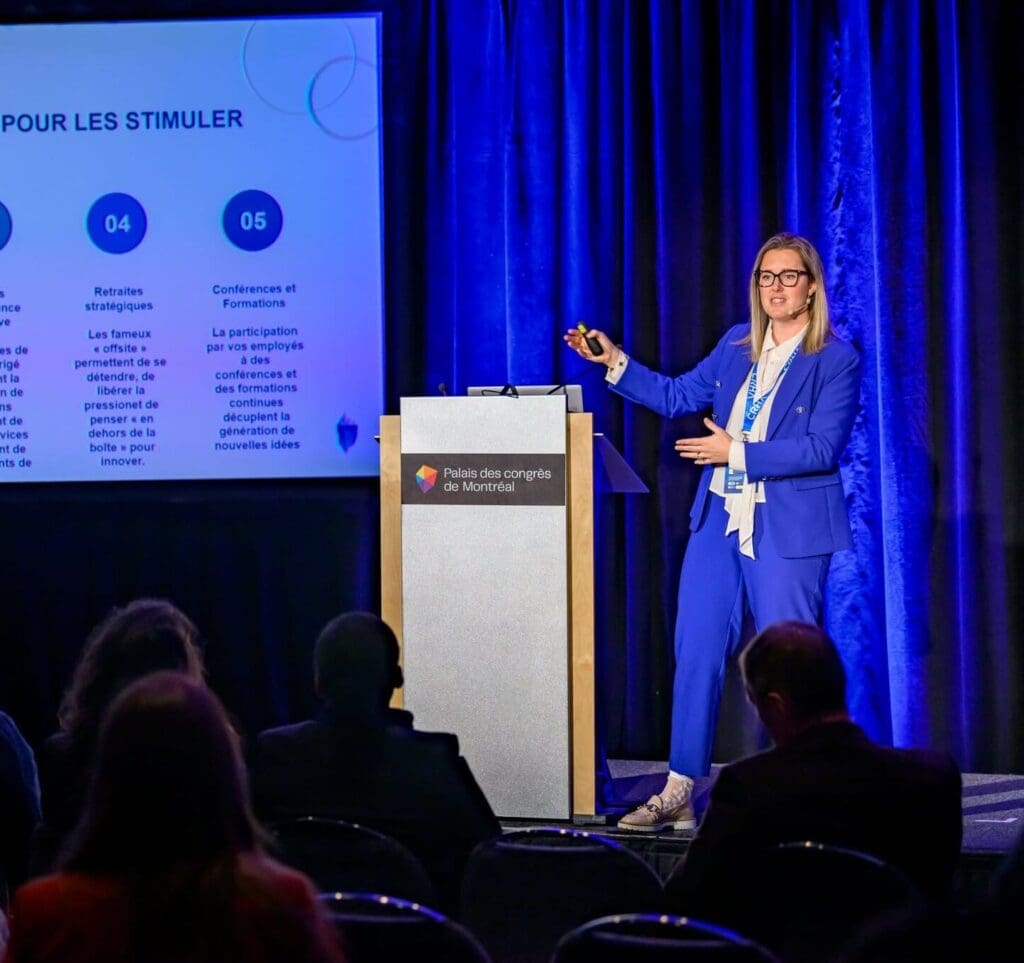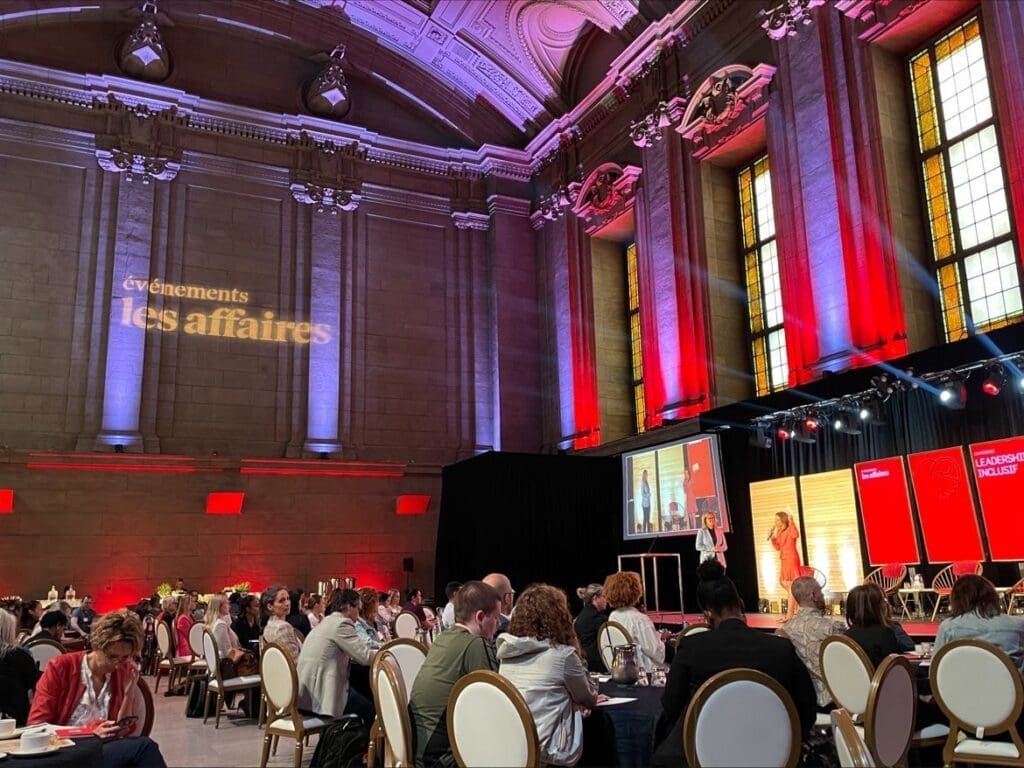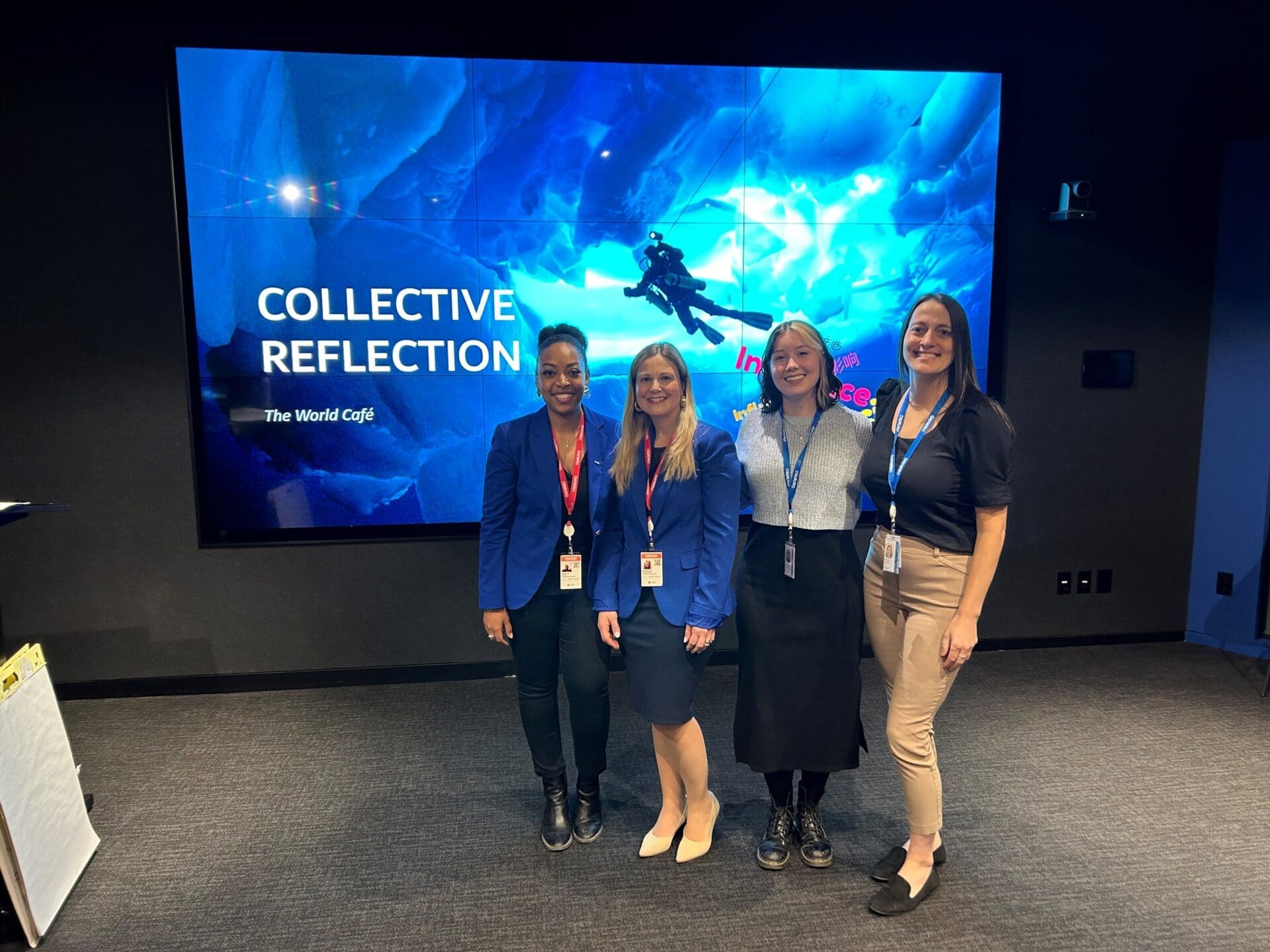Skills Development
Impactful Conferences
The impactful conferences offered by Iceberg Management are strategic interventions that raise awareness, develop skills, and strengthen collective commitment to achieving goals.
By focusing on impactful content and seasoned speakers, organizations create memorable moments that support their culture and sustainable performance.

Introduction
Bringing in a seasoned speaker to lead dynamic and engaging workshop-conferences stimulates the collective intelligence of a large group, creating an environment conducive to evolving practices. These conferences, which combine lectures and interactive exercises, address current organizational concerns while focusing on developing the skills essential to success.
Recommended for:
Mobilizing and inspiring staff
Developing skills
Exchanging ideas via discussion groups
Encouraging buy-in for change
Exploring management best practices
Learning about new research data
Developing a common vocabulary on a complex topic
Creating a moment of appreciation
Featured Content
Entrust Us With Your Next Conference
Choose from our featured conferences or share with us the theme that’s currently driving you: we can create custom content. Each topic is delivered with clarity, relevance, and impact, drawing on research data, industry best practices, emerging trends, and our speakers’ hands-on expertise. Available in “ready-to-deliver” versions or fully customizable to your context or group, impactful conferences inspire action and can transform new ideas into drivers for sustainable performance.
Engaging Your Workforce to Boost Productivity: Sure, But How Do You Actually Do It?
The talent shortage is hitting hard. Many companies are left with vacant positions because their workforce is being lured away by competitors.
You hear it’s not about salaries or benefits, but rather culture and belonging. You invest in these areas, but employees still slip through your fingers. Sometimes they even cite salary as their reason for leaving.
How do you know who’s telling the truth? How can you make a real impact on engaging and retaining your people?
Leadership approaches must adapt. The purpose behind each role needs to be fundamental. Employees must feel genuine love for their work.
This conference reviews Marcus Buckingham’s study on optimal team management. It focuses on self-reflection for managers who want to boost team cohesion and performance.
By implementing structured yet flexible practices that empower your people, you’ll directly influence engagement. You’ll also increase your productivity.
The Power of Influence: Increase Your Impact with Stakeholders
Exercising one’s power of influence is an integral part of a manager’s role. It’s the ability to mobilize resources that help you achieve your goals or increase your capacity to act. It’s also the skill to gain others’ trust and guide them toward a common goal.
The power of influence is critical for managers. They must establish a genuine collaborative climate within multicultural and multigenerational teams. They also need to secure approvals for requests that fall outside established frameworks.
This conference addresses the exercise of legitimate influence. This involves listening to other stakeholders, understanding their perceptions and motivations, and finding ways to adapt to them.
Managers who have developed their power of influence use solid arguments. They present all possible consequences of planned or completed actions: They become role models to follow.
The Impacts of Digital Transformation: How to Leverage Your Talent to Keep Innovating
Digital transformations aren’t just about technology. Their influence is redefining the human skills essential for innovation.
Are you developing creativity and innovation within your company? What’s your strategy for building professional adaptability?
As AI shapes the future and threatens to make skill sets obsolete, the studies are unanimous. They highlight the importance of developing creativity, intuition, and empathy to stay competitive.
This conference explores how these new realities will drive innovation in human capital engagement strategies. It also examines what role HR must play to spark and support these changes.
Collective Intelligence: A Strategic Driver to Transform Your Challenges into Opportunities
Collective intelligence is often described as the sum of a group’s knowledge and skills. It represents a powerful driver for solving problems and strengthening organizational agility.
Involving teams in strategic decisions and removing barriers to change is motivating. It also builds resistance to stress, whether the changes are technological or otherwise.
By integrating all stakeholders into a change process, organizations can better identify risks. They can respond in more appropriate and sustainable ways.
Why is this approach more sustainable? Because stakeholders who are involved in finding solutions develop their ability to adapt to change, thus promoting better organizational resilience.
In this conference, you’ll discover case studies and explore proven facilitation techniques. You’ll learn to integrate the fostering of collective intelligence into the core of your business strategy.
In other words, we’ll transfer our knowledge to help you develop full independence, so you’ll be able to harvest the fruits of collective intelligence on your own.
Know Your Colours: Turning Personality Differences into Team Strengths
Interacting with the people around us in the workplace presents a challenge for most organizations. This is especially true when very different personalities must collaborate.
Professionals who lead or work within high-performing teams must be able to build trust. They need to adjust to their colleagues’ styles and mobilize resources around common goals.
To build this capacity, it’s essential to communicate effectively while respecting differences. The colour-based personality system, inspired by Carl Gustav Jung’s psychological model, is very useful when it goes beyond just theoretical knowledge and is applied in daily practice.
In this conference, participants explore their own communication style. They identify their dominant and secondary colours. They learn to recognize the preferences and sensitivities of other profiles. They discover practical strategies to adapt their approach.
The focus is on behaviours that facilitate relationships and those to avoid, in order to promote harmonious interactions, even during stressful periods.
Optimize Your ROI on Total Compensation: Discover the Strategies of Stand-out Employers
To position yourself as an employer of choice, you need to recognize the importance and strategic potential of total compensation. It goes well beyond a simple amount on a paycheck.
It directly impacts talent attraction, retention, and engagement. It’s up to you to implement a relevant, value-added total compensation program.
In this conference, discover how to identify your organization’s challenges and needs. Learn to apply innovative, contextualized methods while gaining knowledge about best practices. You’ll explore the components of total compensation and different types of programs.
By the end of this conference, you’ll see how effective compensation management controls workforce costs. It also creates substantial positive impacts on procedural fairness, workplace climate, and the achieving of organizational goals.
The Lean Method: How Do We Apply the Fundamentals of Continuous Improvement to Our Business Processes?
The optimizing of business processes is a key priority for organizations that want to gain efficiency, reduce errors, and improve the satisfaction of internal and external clients.
Lean Management offers a structured, proven approach to achieve these goals while also mobilizing teams around a culture of continuous improvement. While often associated with manufacturing, Lean is equally relevant in service environments and administrative functions.
This conference aims to demystify Lean fundamentals and explore practical applications.
You’ll use tools such as process mapping, waste analysis (Muda), the DMAIC method, Ishikawa diagrams, and error-proofing devices (poka-yoke). The session alternates between theoretical input and hands-on practice. This allows participants to apply their learning to their own workplace.
Managers will be equipped to structure their improvement approach and identify non-quality work. By the end of this conference, they’ll leave with a better understanding of how accessible Lean Management can be and practical ways to implement this approach within their organization.
Moving from Theory to Practice: The Art of Taking Action in Managing a Challenging Employee
Human resources management is a daily challenge due to the scope of responsibilities and issues that fall to managers. The challenge becomes even greater when difficult employees require specific and rapid action.
It’s essential to know how to differentiate a difficult employee from an employee in difficulty. Not only will the impact of their actions or behaviours on colleagues be different, but the manager’s approach toward them will also be different.
Where an employee in difficulty needs help, a difficult employee needs reframing. The manager’s approach is therefore completely different. It’s crucial that their leadership allows them to address the situation before it spreads to the rest of the team.
Intervening with difficult employees is a learned skill. This is the theme of this conference, which aims to equip and build confidence in managers who must deal with these profiles within their teams.
By the end of this conference, managers will be more confident with the mechanics of the process. They’ll leave with practical tools to apply in their daily management.
Developing a More Inclusive Environment: Intervening to Reduce Inequalities and Incivility
For years now, globalization and global population movement have highlighted the importance of workplace diversity and equality. Organizations are accountable stakeholders in addressing these challenges. They must view the prevention of discrimination as a strategic necessity.
Systemic discrimination affects all areas of society, especially the workplace. We need to understand and recognize it. In a society that values inclusion, it’s time to remedy areas where these issues persist.
This conference raises individual and collective awareness regarding conscious and unconscious actions. In other words, it helps participants identify unconscious cognitive biases and find ways to eliminate them.
The session covers practical actions you can take. It explores the role of being a diversity ally. It also examines systemic barriers that affect minority groups.
After this conference, leaders and managers become more conscious leaders who improve their workplace’s ability to be truly inclusive.
Time, Stress, and Priority Management: Ready to Improve Yourself?
Lack of time, work overload, and stress are irritating challenges that are part of daily life for leaders and managers. In excessive amounts, they can sometimes make us feel like we’re losing control.
Yet, other equally busy professionals seem to master the situation and perform better than average. Their success often relies on their awareness of their multiple responsibilities as well as their application of the best stress and time management techniques.
They know how to identify the physical and psychological signals of stress or mental and operational overload. They’re proactive in managing their priorities. They recognize time-wasting traps and recharge effectively to maintain good psychological health.
This conference covers proven tools in time and stress management. These include the Eisenhower Matrix, time boxing, and research data from Dr. Sonia Lupien at the Centre for Studies on Human Stress.
Statistics
36 %
Of employees are engaged in the workplace.
36 %
2020 – Employee Engagement Study, Gallup
Yet, engagement is a significant performance driver that must be stimulated.
21 %
Profitability boost (%) from companies with highly engaged employees
21 %
2020 – Employee Engagement Study, Gallup
Conferences are an employee engagement accelerator.
45-60-90 minutes
Popular lengths of conferences
45-60-90 minutes
Our speakers adapt to the time slot you reserve for them.
When time allows in your schedule, we recommend opting for a half-day conference-workshop combination.
100 %
The satisfaction rate of participants we most commonly achieve
100 %
Because we’re continually improving our content and delivering a highly distinctive experience, it’s not uncommon for our speakers to receive perfect scores when assessing attendee satisfaction.
A Conference Improves Engagement
Whether it’s to strengthen buy-in for change, revitalize team morale, or celebrate achievements, an impactful conference improves group cohesion and stimulates motivation to achieve set objectives.
When combined with introspective exercises, conferences become powerful professional development tools at all levels of your organization.

Testimonials
Our Customers’ Experience

Looking for a Workshop Rather Than a Conference?
Let us unlock your collective intelligence and make your next team workshops unforgettable.
Frequently Asked Questions
Helpful Answers
Do you have questions about our conference services or how we can meet your needs? Browse our FAQ and discover clear, practical, and insightful answers to help you make an informed decision about whether to choose Iceberg Management for your next event.
Do you offer custom conferences based on our organizational challenges?
Yes. We offer a choice between standardized, popular, in-depth content, or customized conferences.
When requested, our speakers adapt the content to the context, challenges, and goals of your organization and your participants, to generate maximum impact and drive change.
What is the format and length of a typical conference?
Conferences typically last between 60 and 90 minutes, and can be delivered in person or virtually.
Express 30-minute sessions or full-day or half-day conference and workshop combinations are also available.
What type of audience do your conferences target?
Our speakers have the ability to connect with their target audience.
Our conferences are designed for managers, executives, or all employees within an organization, as well as professionals across all sectors of industry (human resources, engineers, veterinarians, opticians, lawyers, bankers, healthcare workers, golfers, etc.).
Topics are adapted to the knowledge and experience (often heterogeneous) of the audience.
How much does a conference cost?
Pricing varies depending on the length, format, and level of customization required. Contact us for a quick quote tailored to your needs
Do you offer conferences in English?
Yes, we do! Some of our speakers also offer their talks in English, depending on the topic. We’ll be able to direct you to the right person.
How far in advance should I book a conference?
Ideally, six to eight weeks in advance, but it’s sometimes possible to organize a conference more quickly, depending on your needs and our availability.
Can the conference be integrated into an existing event?
Absolutely. We adapt the content and format to fit seamlessly into your conferences, strategic retreats, or themed events.
